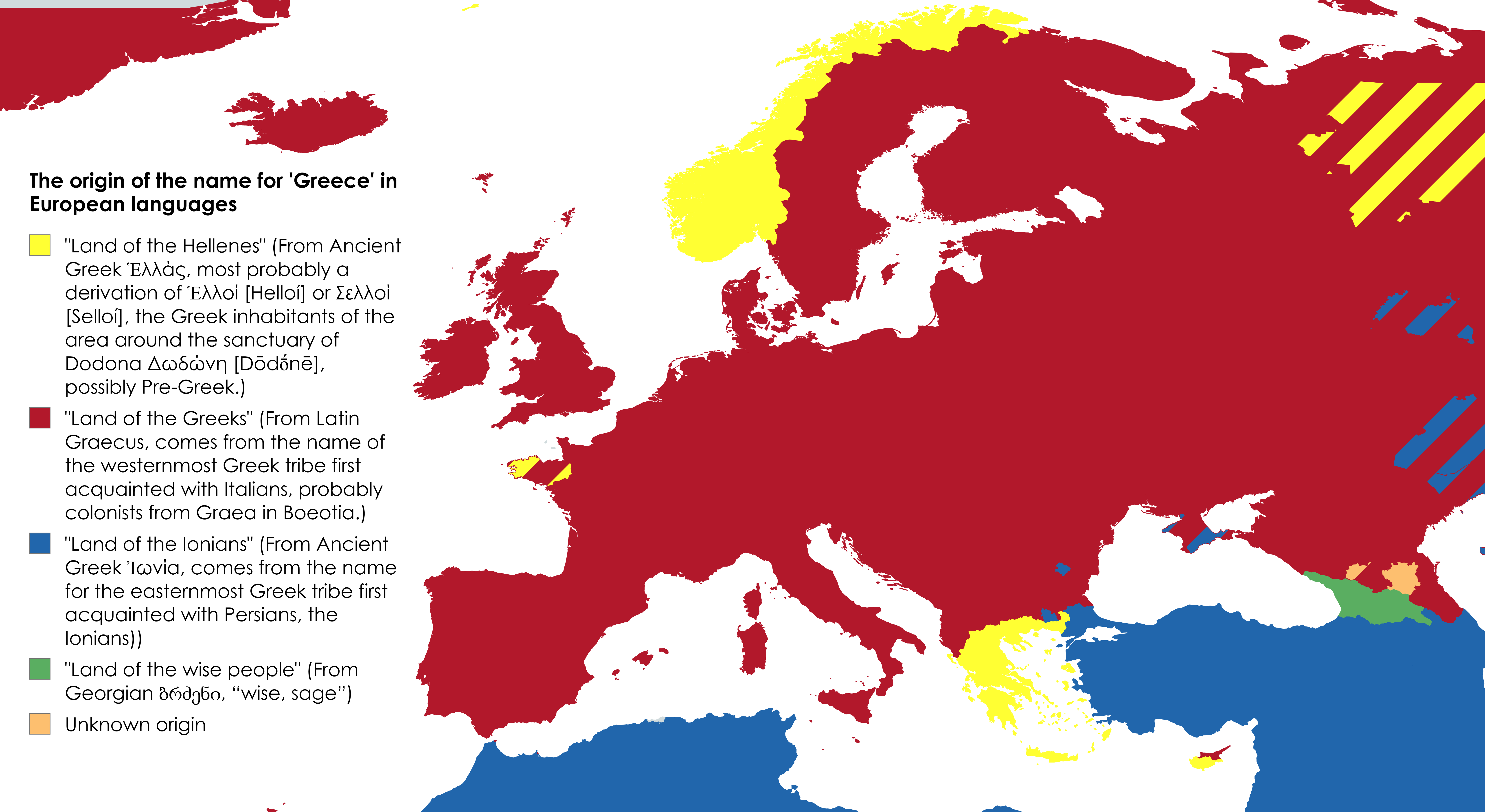Origin of the Name for Greece in European Languages Map


David Chen
Data Visualization Specialist
David Chen is an expert in transforming complex geographic datasets into compelling visual narratives. He combines his background in computer science ...
Geographic Analysis
What This Map Shows
The map titled "Origin of the Name for Greece in European Languages" presents a fascinating exploration of how the name of Greece is expressed across various European languages. Each linguistic representation highlights the cultural and historical nuances of the name that has come to symbolize not just a country but a rich tapestry of history, philosophy, and art. By understanding the different names used for Greece, we can gain insights into how this ancient civilization has influenced the broader European narrative.
Deep Dive into the Origin of the Name
The name 'Greece' itself can be traced back to the Latin word 'Graecia,' which referred to the Hellenic people. Interestingly, the Greeks refer to their country as 'Hellas' (Ελλάς) and themselves as 'Hellenes' (Έλληνες). This distinction is crucial because it underscores a cultural identity that predates the concept of Greece as understood in the modern sense. The term 'Greece' emerged through Roman interpretations of the Greek culture and language, which were later adopted and adapted into other European tongues.
However, the variations of the name in different languages offer a glimpse into the historical relationships between Greece and its neighbors. For instance, in Italian, Greece is referred to as 'Grecia,' while in French, it's 'Grèce.' These adaptations reflect the linguistic evolution and the historical interactions that shaped Europe's understanding of Greek civilization. Interestingly, some languages, like Russian, use 'Греция' (Gretsiya), which still echoes the ancient roots, yet illustrates a Slavic twist that signifies adaptation and local integration.
In the Balkans, languages such as Serbian and Bulgarian use variations of 'Grčka' and 'Гърция' (Gǎrziya) respectively, revealing how regional influences and historical connections have shaped the nomenclature. Particularly in the Balkan region, the name often reflects the Ottoman Empire's historical presence, which has left its mark on the languages and identities of the area. In contrast, Scandinavian languages like Swedish and Danish use 'Grekland,' which connects to the medieval Latin influence, showcasing how trade routes and cultural exchanges resulted in a shared linguistic heritage.
Moreover, the transformation of the name across languages also reflects the varying degrees of influence that Greek philosophy, democracy, and arts had on Europe. The widespread adoption of Greek terms in European languages for concepts like democracy and philosophy points to a legacy that extends beyond mere nomenclature. This linguistic journey not only highlights the name but also the ideas and cultural exchanges that have persisted through centuries.
Regional Analysis
Looking closely at the map, we can dissect the linguistic variations regionally. Southern European countries, such as Italy and Spain, have names that closely resemble their Latin roots, indicating a direct connection to the Roman Empire's influence. In contrast, northern European languages exhibit a more pronounced shift, adapting the name to fit their phonetic and grammatical structures. For instance, while the Italian 'Grecia' retains a semblance to its Latin origin, in German, it becomes 'Griechenland,' which translates to 'Land of the Greeks,' emphasizing not just identity but also geography.
Eastern European countries like Poland and Hungary also illustrate unique adaptations, with names that often reflect historical ties with the Byzantine Empire. The Hungarian term 'Görögország' literally means 'Country of the Greeks,' which showcases a different cultural perspective by placing emphasis on the 'country' rather than the people. Furthermore, the way these names are phonetically structured across languages indicates not only linguistic but also social integration, as nations have interacted through trade, diplomacy, and migration.
Significance and Impact
Understanding the etymology of Greece’s name across European languages is more than just a linguistic exercise; it provides a lens through which we can view the historical and cultural interplay that has defined Europe. Names carry weight; they encapsulate history, identity, and the evolution of societies. The variations reflect not only the linguistic diversity of Europe but also the shared cultural heritage that binds these nations together.
In today’s globalized world, this understanding can foster greater appreciation for cultural diversity and historical connections. As we navigate through modern discussions about identity and heritage, recognizing the roots of names can deepen our understanding of national pride and cultural expressions. As we look to the future, one might ponder how the ongoing cultural exchanges will continue to shape the names we use and the identities we hold dear. Will new names emerge as cultures blend, or will we hold onto the rich histories encapsulated in our languages?
Ultimately, the map serves as a reminder that the journey of a name is as significant as the land it represents, inviting us to explore the interconnectedness of cultures in our diverse world.
Visualization Details
- Published
- September 29, 2025
- Views
- 58
Comments
Loading comments...